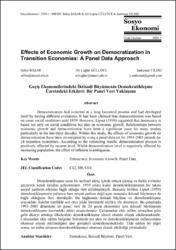| dc.contributor.author | Başar, Selim | |
| dc.contributor.author | Güllüce, Ali Çağlar | |
| dc.contributor.author | Yıldız, Şaduman | |
| dc.date.accessioned | 2020-12-02T13:22:11Z | |
| dc.date.available | 2020-12-02T13:22:11Z | |
| dc.date.issued | 2009 | en_US |
| dc.identifier.uri | https://hdl.handle.net/20.500.12403/2267 | |
| dc.description.abstract | Democratization had occurred in a long historical process and had developed itself by having different evolutions. It had been claimed that democratization was based on some social conditions until 1959. However, Lipset (1959) suggested that democracy is based not only on social conditions but also on economic growth. Relationships between economic growth and democratization have been a significant issue for many studies particularly in the last three decades. Within this study, the effects of economic growth on democratization have been investigated by using a panel data set for 1993-2005 periods for 24 transition economies. According to the estimating results, democratization process is positively affected by income level. Whilst democratization level is negatively affected by increasing population, the effect of inflation is ambiguous. | en_US |
| dc.language.iso | eng | en_US |
| dc.publisher | Sosyoekonomi | en_US |
| dc.subject | Democracy, Economic Growth, Panel Data | en_US |
| dc.title | Effects of Economic Growth on Democratization in Transition Economies A Panel Data Approach | en_US |
| dc.type | article | en_US |
| dc.contributor.department | Bayburt Üniversitesi, İktisadi ve İdari Bilimler Fakültesi, İktisat Bölümü | en_US |
| dc.contributor.authorID | 0000-0002-9990-0628 | en_US |
| dc.relation.publicationcategory | Makale - Uluslararası Hakemli Dergi - Başka Kurum Yazarı | en_US |



















